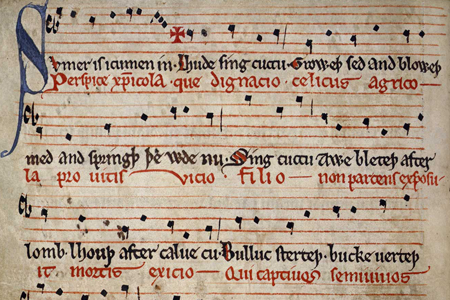
Like language, music has existed longer than recorded history. It is probable that the first music would’ve been sung, but not necessarily with words. If we define music as any sound that conveys emotion, then music could easily predate language. A great article about the beginnings of music can be read here.
With the first examples of the written word being approximately 5,000 years old, musical instruments considerably predate this. The earliest found instruments are flutes carved from bone that have been discovered in caves throughout Europe, with the oldest being 42,000 to 43,000 years old. Found in the Geßenküsterle Cave in Germany, they were carved from Mammoth ivory.

Here’s what one of those ancient instruments sounded like.
In the 8th century BCE Homeric epic poems like the Iliad and the Odyssey were not memorized in school and recited by rote. Homeric poems were originally passed from generation to generation by being sung and the bards that sang them were prized for their ability to sing and improvise the story and melody on the spot! This is a short and fascinating documentary on how scholars have brought this music back to life.
The earliest written down melody is from about 3400 years ago and was found on a clay tablet in what is today Ugarit, Syria.

And it sounded like this.
It is touching, and still a lesson for us all, that the earliest complete song that we know (Greece, 200 BCE) is the Song of Seikilos. It tells us that life is too short to worry about trivialities.
Hoson zēs, phainou
Mēden holōs sy lypou;
Pros oligon esti to zēn
To telos ho chronos apaitei
English
As long as you live, shine,
Let nothing grieve you beyond measure
For your life is short,
and time will claim its toll.
One of the oldest songs in English, well it’s in Middle English, comes from the 13th century and written in Oxford around 1260.
Sumer is icumen in (Summer has come in).

and sounds like,
Sumer is icumen in, Lhude sing cuccu! Groweþ sed and bloweþ med And springþ þe wde nu, Sing cuccu! Awe bleteþ after lomb, Lhouþ after calue cu. Bulluc sterteþ, bucke uerteþ, Murie sing cuccu! Cuccu, cuccu, wel singes þu cuccu; Ne swik þu nauer nu. Sing cuccu nu. Sing cuccu. Sing cuccu. Sing cuccu nu!
Modern English translation
Summer has come in, Loudly sing, cuckoo! The seed grows and the meadow blooms And the wood springs anew, Sing, cuckoo! The ewe bleats after the lamb The cow lows after the calf. The bullock stirs, the goat farts, Merrily sing, Cuckoo! Cuckoo, cuckoo, well you sing, cuckoo; Don’t ever you stop now, Sing cuckoo now. Sing, Cuckoo. Sing Cuckoo. Sing cuckoo now!
The music of Claudio Monteverdi (1567–1643) is what I believe is the beginning of the modern style. It is music that when heard today still seems completely connected, in tone and message, to society’s concerns. His songs could be played with a lute, electric guitar, or electronic sounds and they’d still work.
He is a subject for another blog, but here is a great performance of his Fourth Book of Madrigals, performed by Les Arts Florissants. The English translation of each madrigal can be found here.
